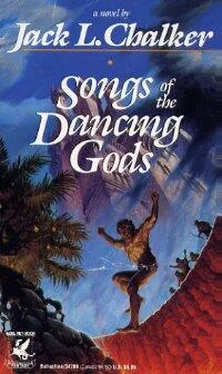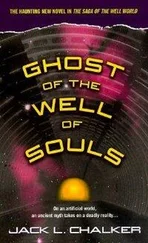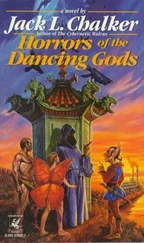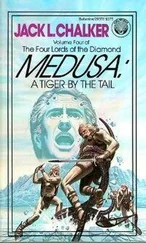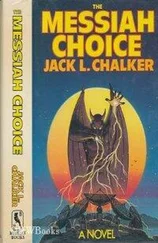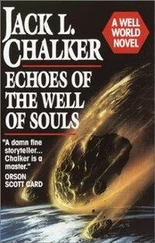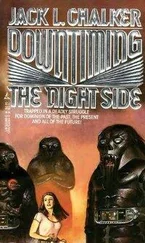Jack Chalker - Songs of the Dancing Gods
Здесь есть возможность читать онлайн «Jack Chalker - Songs of the Dancing Gods» весь текст электронной книги совершенно бесплатно (целиком полную версию без сокращений). В некоторых случаях можно слушать аудио, скачать через торрент в формате fb2 и присутствует краткое содержание. Год выпуска: 1990, ISBN: 1990, Издательство: Del Rey / Ballantine, Жанр: Фэнтези, на английском языке. Описание произведения, (предисловие) а так же отзывы посетителей доступны на портале библиотеки ЛибКат.
- Название:Songs of the Dancing Gods
- Автор:
- Издательство:Del Rey / Ballantine
- Жанр:
- Год:1990
- ISBN:0-345-34799-4
- Рейтинг книги:3 / 5. Голосов: 1
-
Избранное:Добавить в избранное
- Отзывы:
-
Ваша оценка:
- 60
- 1
- 2
- 3
- 4
- 5
Songs of the Dancing Gods: краткое содержание, описание и аннотация
Предлагаем к чтению аннотацию, описание, краткое содержание или предисловие (зависит от того, что написал сам автор книги «Songs of the Dancing Gods»). Если вы не нашли необходимую информацию о книге — напишите в комментариях, мы постараемся отыскать её.
Songs of the Dancing Gods — читать онлайн бесплатно полную книгу (весь текст) целиком
Ниже представлен текст книги, разбитый по страницам. Система сохранения места последней прочитанной страницы, позволяет с удобством читать онлайн бесплатно книгу «Songs of the Dancing Gods», без необходимости каждый раз заново искать на чём Вы остановились. Поставьте закладку, и сможете в любой момент перейти на страницу, на которой закончили чтение.
Интервал:
Закладка:
“Yeah, yeah, I know all that. You told me. But— change sheets!”
“In the beginning,” Tiana explained, “the incomplete universe which contained Husaquahr was basically chaotic. Even the basics, like gravity, only worked some of the time. The Founding Angels rushed in to do what they could, establish a basic set of Angelic Laws to supplement natural laws where they were weak, creating stability out of the chaos. Being lesser, they still took a number of short cuts, creating much imitation of Earth but often not quite like Earth. Given a core number of souls by the Creator, early experiments produced strange results, in which the soul itself took on physical reality and mated with those things of animal and plant which imitated forms from Earth. The offspring of those created the thousands of races of faerie.* Essentially immune to age, they were made very slow to breed, and set to supplementing the angels in their establishing tasks, from climatological management, like the legendary Frost Giants, to the mineral management of the dwarves, the flower-tending of the pixies, and the husbandry of the nymphs and satyrs. The basics were maintained by the least of the souls, the elementals.
*Faerie refers to the heritage, magic nature, power, and “realm” of fairies in general; it has a connotation of that which is withdrawn from human ken. Fairy refers in more specific-manner to individuals, races, traits, and abilities of the fairy folk; its connotation is more that of a normal, day-today existence.
“After the Great Upheaval on Earth, some of the fallen humans were given to the angels of Husaquahr to establish their dominion here and duplicate the basic system. But since they were already stained by sin, these humans had a hard time from the start and even less wisdom. To compensate, the angels mated with men and produced a hybrid race. Half retained more of the angelic powers and began the line of sorcery; the other half gained higher wisdom, and became the founders of the royal lines. The sorcerers then became the finishers of the work, as the angelic powers had to withdraw, and, from experience living in this new world and from their own humanity, wrote the Books of Rules to bind and control and shape the subsequent history of Husaquahr for both faerie and human.
“That, of course, was close to the dawn of human time. After a while—who knew how long—these first founders felt their job done and went on to some higher, perhaps angelic plane, themselves; their children now became the sorcerers. But, although sorcerers tended to live impossibly long lives, as each generation of them grew and the elders eventually tired and went on to wherever sorcerers went on to, the angelic blood was diluted more and more with humans. The powers of five generations before were only shadows of what their ancestors could do; those today mere shadows of that generation. And yet, each generation, generation after generation, kept on finding loopholes or specifics not addressed in the Rules and, as such, amended them. They couldn’t really change what their more powerful predecessors had decreed, but they could keep adding, keep ‘plugging in the holes’ as time passed. And the less power and the less wisdom that they had, the more holes they found and the more new Rules they wrote.
“By now, the sorcerous bureaucracy was incredibly well organized; it only remained for that huge assembly to get out the amendations and hair-splitting new Rules to all those magical folk and royal, temporal powers throughout the world so that they would know what was being done.”
“There’s probably a Rule in this batch regulating the length of nose hairs,” Joe muttered.
“Oh, no,” Tiana responded sourly. “They would have addressed something that major generations ago.”
Irv looked at the last wagon to pass and imagined the mountain of paper contained within. “Is there anybody who knows even half of what’s in them papers?” he asked.
“Probably not, not even among those that create them,” Tiana responded honestly. “It doesn’t make any difference. Once the Rules are properly distributed, they go into force and we’re stuck with them. They’re not like laws, you know. Those are made by governments, which we also have plenty of. Everyone, even nonhumans, will be bound by whatever is in there as if it is natural law, like breathing or what goes up usually comes down.”
“And you ain’t worried? I mean, that somethin’ buried in one of them wagons won’t suddenly change the way we look or talk or think or act?”
“I was born here,” she reminded him, “I sort of take it fo r granted.”
“You just learn to forget that it’s going on,” Joe told him. ” You can’t do anything about it anyway, and by this time everything really nasty that they could do has either been done or been stepped on by some prior rule so it’s canceled out anyway. I wouldn’t worry about it.”
The boy frowned. “But if all them papers don’t make no difference, then why do it at all?”
“Oh, they might make some minor differences,” Tiana told him. “Still, you are right—it’s mostly harmless at this point. But, you see, constantly revising and perfecting the Rules takes a huge bureaucracy, larger than the kind that runs most governments. Thousands upon thousands of people and fairies, all employed in everything from proposing the additions to arguing for them or against them, helping adopt and implement them, printing and delivering them—it’s a massive undertaking.”
“And yet all them people do all that work and nothin’ much happens because of it?”
“Essentially, yes.”
“Then why do they do it? Seems like a total waste of time.”
“Oh, their positions are essential,” she responded matter-of-factly. “If they didn’t do what they did, then all those masses would be unemployed, and, being bureaucrats, most of them couldn’t do anything useful. Why, they wouldn’t survive!”
“Or, worse, they might get together and try to do something really useful,” Joe added. “That would be a disaster. So, don’t worry much about it, and particularly not yet. You’re still not quite within the Rules. So long as you aren’t physically changed here by some magic, you’re still outside the more specific rules. Unless you’re a changeling, which I seriously doubt, since we’d have noticed by this time, you’ll just slowly come under more and more the longer you’re here, without even noticing it.”
“Changeling. Yeah, Like that sexy broad with the wings we melon the boat.”
“Uh-huh. Marge. She came over with me and at the time was as human as Tiana or me. She changed into one of the fairy races after she was here. It happens. But I doubt if you qualify.
I seriously doubt if your mother had that trigger in her genes, and I sure don’t. And, judging by the time she took to change, I think you’d have done it by now if you were going to, anyway.”
“What do’ya mean by trigger in my jeans? I ain’t got no jeans on.”
“In your blood,” Joe told him. “If you’d ever gone to church back home, you’d know that it wasn’t just here that angels mated with people. That was so long ago, though, back before Moses’ time, that it’s even more diluted back there than here. But some folks have a little of that blood, either from the angels or from demons, too, or early fairy-human matings, passed down in them. If you do, you become a changeling when you get here.”
“Jeaz… I think that’d be kind a neat,” the boy said. “Maybe growin’ wings and gettin’ magic powers and all that. Uh—did you say demons?”
Joe nodded. “There’s some pretty mean fairies, too. Pray you don’t meet them, believe me!”
Читать дальшеИнтервал:
Закладка:
Похожие книги на «Songs of the Dancing Gods»
Представляем Вашему вниманию похожие книги на «Songs of the Dancing Gods» списком для выбора. Мы отобрали схожую по названию и смыслу литературу в надежде предоставить читателям больше вариантов отыскать новые, интересные, ещё непрочитанные произведения.
Обсуждение, отзывы о книге «Songs of the Dancing Gods» и просто собственные мнения читателей. Оставьте ваши комментарии, напишите, что Вы думаете о произведении, его смысле или главных героях. Укажите что конкретно понравилось, а что нет, и почему Вы так считаете.
